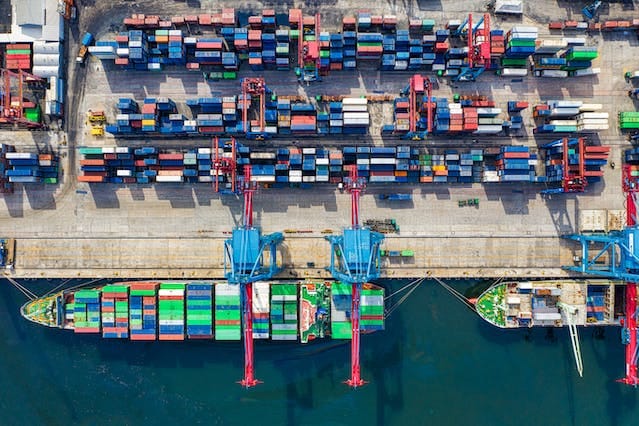IMF's Optimistic Outlook on China's Economy | Upward Revision in GDP Forecast for 2023 and 2024 with Government Support and Consumption Growth
Discover the positive trajectory of China's economy with IMF's optimistic outlook. Upward revisions in GDP forecast for 2023-2024 fueled by government support and robust consumption growth

Introduction to IMF's Economic Prognosis for China
As an economist, staying abreast of the latest International Monetary Fund (IMF) reports is crucial for understanding the global economic landscape. The IMF's recent economic prognosis for China has ignited significant interest and debate within the financial community. With the world's second-largest economy, China's growth trajectory holds significant implications for global markets and trade. The IMF's positive outlook for China's economic growth, specifically the upward GDP forecast for 2023-2024, has become a focal point of analysis and discussion. This article delves deep into the factors and dynamics influencing China's economic growth and the potential impact on the global economy.
Understanding China's Economic Growth
China's economic growth has been a subject of fascination and scrutiny for decades. The nation's remarkable transformation from a primarily agrarian society to a global economic powerhouse has been a testament to its resilience and adaptability. Understanding the key drivers behind China's economic growth involves examining various facets of its economy, including industrial production, consumer spending, government policies, and international trade. China's economic growth is also closely linked to its ability to innovate, adapt to technological advancements, and navigate geopolitical challenges.

The IMF's economic prognosis for China takes into account the country's diverse economic landscape, encompassing both urban and rural sectors. The significant role played by state-owned enterprises, private businesses, and the burgeoning technology sector in driving economic growth cannot be overlooked. Additionally, China's integration into the global supply chain and its role as a major trading partner for numerous countries significantly influences its economic growth trajectory.
China's economic growth is not devoid of challenges. The nation continues to grapple with income inequality, environmental sustainability, and demographic shifts, all of which impact its long-term economic prospects. The IMF's analysis of China's economic growth provides an insightful perspective on the nation's progress and the challenges it is likely to encounter in the near future.
Factors influencing China's GDP Growth Forecast
The IMF's outlook for China's GDP growth in 2023-2024 is underpinned by a myriad of factors that collectively shape the nation's economic trajectory. A comprehensive understanding of these factors is essential for contextualizing the IMF's prognosis and its potential implications for global financial markets. Key factors influencing China's GDP growth forecast include domestic consumption trends, government policies, the property market, fiscal stimulus measures, and the evolving dynamics of the global economy.
China's GDP growth forecast is intricately linked to the government's economic policies and regulatory initiatives. The IMF's analysis considers the impact of China's economic policy on fostering sustainable growth while addressing structural vulnerabilities. Moreover, the interplay between fiscal stimulus measures and their efficacy in bolstering economic activity is a critical aspect of the IMF's prognosis.
The property market exerts a profound influence on China's GDP growth, given its significance as a driver of investment and wealth creation. The IMF's assessment of the property market's impact on China's economic growth provides valuable insights into the interconnectedness of different sectors within the economy. Furthermore, the robustness of domestic consumption trends and their resilience in the face of evolving economic conditions play a pivotal role in shaping China's GDP growth forecast.
Analyzing the 2023-2024 Projections
The IMF's projections for China's GDP growth in 2023-2024 are a focal point of interest for economists and market participants alike. The nuanced analysis underlying these projections encompasses a range of economic indicators, policy levers, and external factors that collectively shape the trajectory of China's economy. Understanding the IMF's rationale for projecting an upward GDP forecast for China requires a deep dive into the underlying economic data and the assumptions that underpin these projections.
The robustness of China's economic recovery and its resilience in the face of global economic headwinds form the bedrock of the IMF's positive outlook. The nation's ability to navigate the challenges posed by the COVID-19 pandemic and sustain its economic momentum has been a key consideration in formulating the GDP growth projections. Additionally, the IMF's analysis of China's economic strategy and its alignment with sustainable growth objectives provides a comprehensive framework for evaluating the 2023-2024 projections.
The IMF's projections for China's GDP growth factor in the evolving dynamics of the global economy and the interconnectedness of financial markets. The interplay between international trade, geopolitical developments, and China's role in shaping the global economic landscape is a critical aspect of the IMF's analysis. Furthermore, the IMF's assessment of China's economic resilience and its capacity to drive global economic recovery underscores the significance of the 2023-2024 projections in a broader context.
Government Support and Economic Policy
China's economic growth is profoundly influenced by the government's support and its strategic economic policies. The IMF's economic prognosis for China underscores the pivotal role played by government initiatives in fostering sustainable and inclusive growth. The effectiveness of government support measures in mitigating economic risks, stimulating investment, and bolstering consumer confidence forms a cornerstone of the IMF's analysis.
The alignment of China's economic policy with broader development objectives and its impact on key economic indicators feature prominently in the IMF's prognosis. The government's emphasis on technological innovation, infrastructure development, and sustainable urbanization significantly influences the IMF's outlook for China's economic growth. Moreover, the IMF's assessment of the government's response to demographic shifts and environmental sustainability imperatives sheds light on the nation's long-term economic prospects.
The IMF's analysis of China's economic policy extends beyond domestic considerations and encompasses the nation's role in shaping global economic governance. The alignment of China's economic strategy with international trade dynamics, climate change mitigation efforts, and multilateral cooperation holds implications for the global economy. The IMF's prognosis underscores the interconnectedness of China's economic policy with the broader aspirations of sustainable development and inclusive growth.
Impact of Property Market on GDP Forecast
The property market exerts a profound influence on China's GDP forecast, shaping investment dynamics and wealth creation. The IMF's analysis of the property market's impact on China's economic growth provides valuable insights into the interconnectedness of different sectors within the economy. The resilience of the property market and its capacity to navigate regulatory changes and market fluctuations significantly influences the IMF's GDP forecast for China.

The government's regulatory interventions and their efficacy in balancing property market stability with sustainable growth objectives are a focal point of the IMF's analysis. The IMF's prognosis takes into account the impact of property market dynamics on investment patterns, credit availability, and consumer sentiment. Moreover, the IMF's assessment of the property market's role in shaping wealth distribution and income inequality sheds light on its implications for China's economic trajectory.
The interplay between the property market and broader economic indicators such as industrial production, consumer spending, and investment activity forms a critical aspect of the IMF's analysis. The IMF's projections for China's GDP growth factor in the property market's resilience and its capacity to navigate evolving economic conditions. Furthermore, the IMF's assessment of the property market's alignment with sustainable development imperatives provides a comprehensive framework for evaluating the nation's economic prospects.
Consumption Trends and Fiscal Stimulus
China's consumption trends and the efficacy of fiscal stimulus measures are pivotal considerations in shaping the nation's GDP growth forecast. The IMF's analysis of consumption trends and their resilience in the face of evolving economic conditions provides valuable insights into China's economic trajectory. The nation's ability to sustain robust consumption patterns and stimulate domestic demand forms a cornerstone of the IMF's positive outlook for China's economic growth.
The efficacy of fiscal stimulus measures in bolstering economic activity and driving investment dynamics significantly influences the IMF's GDP forecast for China. The alignment of fiscal policy with broader economic objectives and the government's response to cyclical economic challenges are key considerations in the IMF's analysis. Moreover, the IMF's assessment of the interplay between fiscal stimulus, investment dynamics, and consumption trends sheds light on China's economic resilience.
China's consumption trends are not devoid of challenges, and the IMF's prognosis takes into account the impact of demographic shifts and changing consumer preferences on the nation's economic trajectory. The evolving dynamics of e-commerce, technological innovation, and urbanization significantly shape consumption patterns and hold implications for China's GDP growth forecast. The IMF's analysis of consumption trends and their interplay with fiscal stimulus measures provides a comprehensive framework for evaluating the nation's economic prospects.
Market Dynamics and Global Economy
The interconnectedness of China's market dynamics with the global economy is a critical aspect of the IMF's economic prognosis. China's role as a major trading partner, investment destination, and source of technological innovation significantly influences the IMF's analysis of its economic growth prospects. The IMF's assessment of market dynamics encompasses the interplay between supply chain resilience, trade patterns, and the nation's capacity to navigate geopolitical challenges.
The evolving dynamics of the global economy, including shifts in trade alliances, technological advancements, and climate change mitigation efforts, hold implications for China's economic growth. The IMF's analysis of market dynamics takes into account China's resilience in the face of global economic headwinds and its capacity to drive economic recovery. Moreover, the IMF's assessment of China's market dynamics sheds light on the nation's role in shaping global economic governance and trade policies.
China's market dynamics are profoundly influenced by technological innovation, digital transformation, and the nation's capacity to adapt to evolving consumer preferences. The IMF's analysis of market dynamics encompasses the role played by China in shaping international trade patterns, investment flows, and technological collaboration. The interconnectedness of China's market dynamics with the global economy underscores the significance of the nation's economic growth for global financial markets and trade.
Consumer Confidence and Financial Markets
Consumer confidence and its influence on financial markets are pivotal considerations in shaping China's economic growth trajectory. The IMF's analysis of consumer confidence trends and their interplay with financial market dynamics provides valuable insights into the nation's economic prospects. The resilience of consumer confidence in the face of economic uncertainties and its impact on investment patterns form a cornerstone of the IMF's positive outlook for China's economic growth.
The alignment of financial market dynamics with broader economic indicators such as inflation, interest rates, and exchange rate stability significantly influences the IMF's GDP forecast for China. The interplay between monetary policy, capital flows, and consumer sentiment is a critical aspect of the IMF's analysis. Moreover, the IMF's assessment of China's financial markets sheds light on the nation's capacity to navigate market fluctuations and sustain investment activity.
China's financial markets are not devoid of challenges, and the IMF's prognosis takes into account the impact of regulatory reforms, market volatility, and global economic uncertainties on the nation's economic trajectory. The evolving dynamics of fintech, digital currency innovation, and the integration of China's financial markets with global financial systems significantly shape the IMF's analysis of China's economic prospects. The IMF's analysis of consumer confidence and financial markets provides a comprehensive framework for evaluating the nation's economic resilience.
China's Economic Strategy for Sustainable Growth
In conclusion, the IMF's positive prognosis for China's economic growth, with an upward GDP forecast for 2023-2024, underscores the nation's resilience and adaptability in navigating economic challenges. Understanding the multifaceted factors influencing China's GDP growth forecast, including government support, consumption trends, market dynamics, and financial markets, is essential for contextualizing the IMF's economic prognosis. The nation's economic strategy for sustainable growth, underpinned by strategic policy initiatives and resilience in the face of global economic headwinds, holds significant implications for the global economy.
As economists, policymakers, and market participants, comprehending China's economic strategy and its alignment with sustainable growth objectives is imperative for making informed decisions and formulating robust economic policies. The IMF's analysis of China's economic growth trajectory provides valuable insights into the nation's role in shaping the global economic landscape and driving economic recovery. By delving deep into the intricacies of China's economic prospects, we can gain a comprehensive understanding of the nation's economic resilience and its potential impact on global financial markets.
In conclusion, the IMF's positive prognosis for China's economic growth, with an upward GDP forecast for 2023-2024, underscores the nation's resilience and adaptability in navigating economic challenges. Understanding the multifaceted factors influencing China's GDP growth forecast, including government support, consumption trends, market dynamics, and financial markets, is essential for contextualizing the IMF's economic prognosis. The nation's economic strategy for sustainable growth, underpinned by strategic policy initiatives and resilience in the face of global economic headwinds, holds significant implications for the global economy.
As economists, policymakers, and market participants, comprehending China's economic strategy and its alignment with sustainable growth objectives is imperative for making informed decisions and formulating robust economic policies. The IMF's analysis of China's economic growth trajectory provides valuable insights into the nation's role in shaping the global economic landscape and driving economic recovery. By delving deep into the intricacies of China's economic prospects, we can gain a comprehensive understanding of the nation's economic resilience and its potential impact on global financial markets.
CTA
For more insights on global economic trends and market analysis, subscribe to our newsletter and stay ahead of the curve in the dynamic world of finance and economics.




